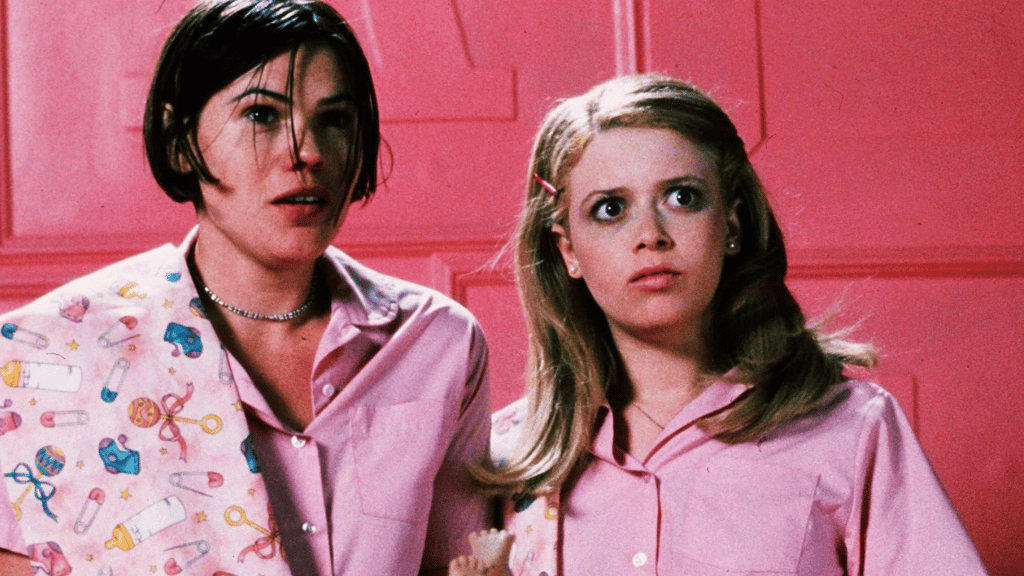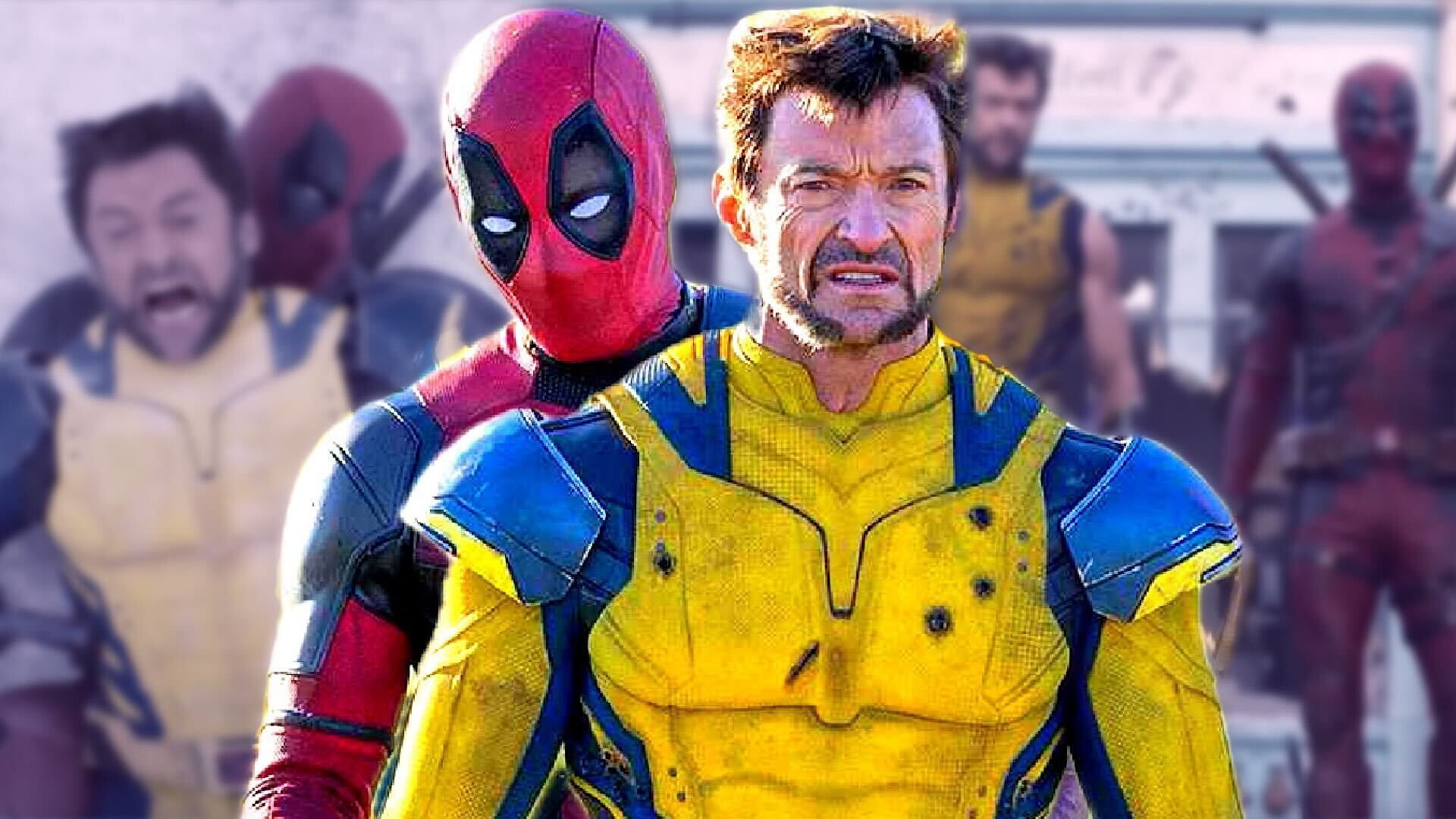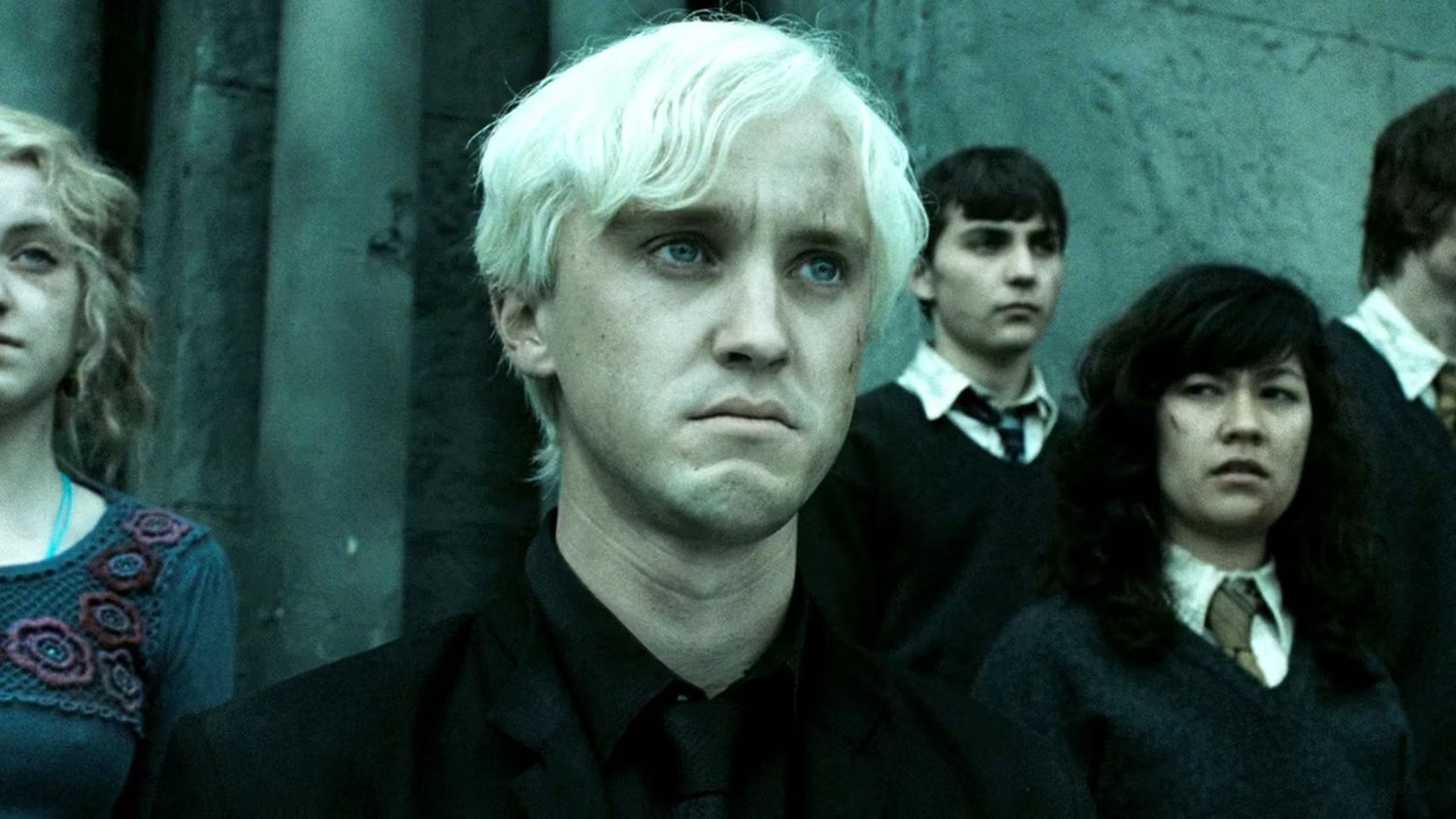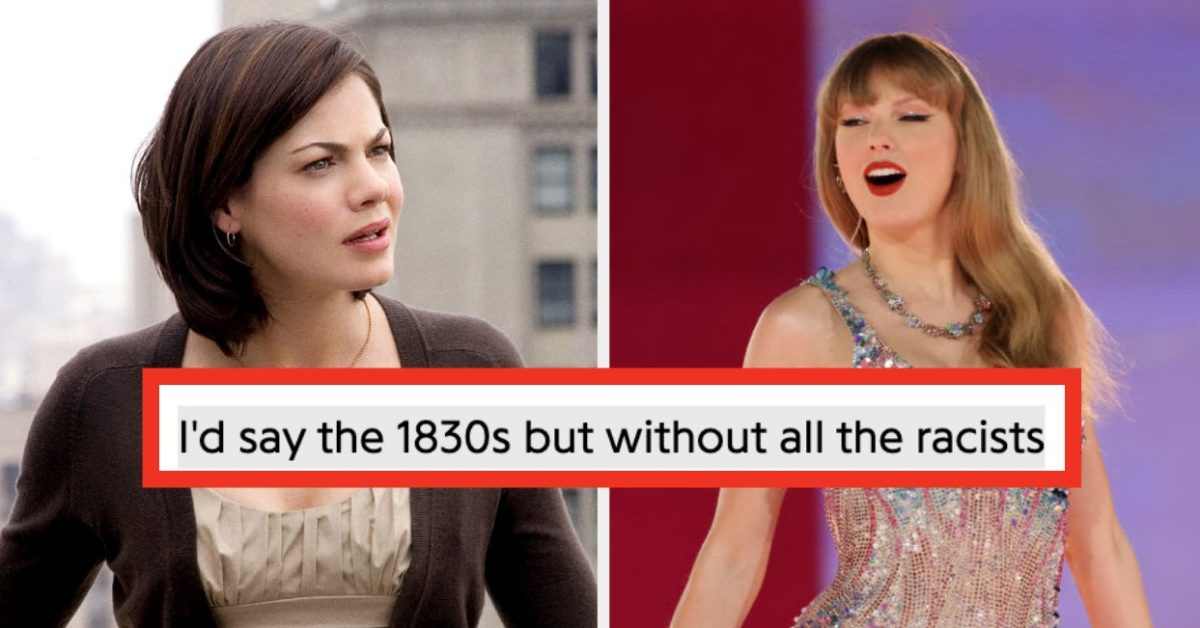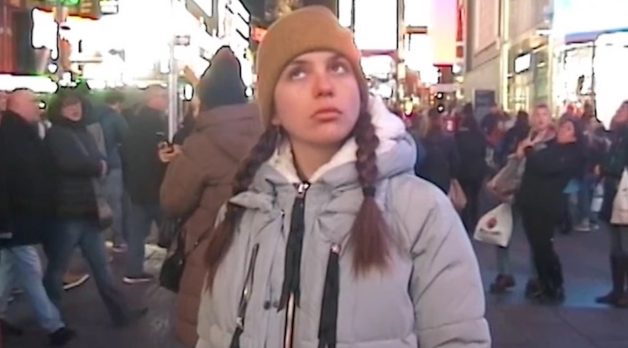
“We Expected for Pretty Much No One To See It”: Justin Zuckerman on Yelling Fire in an Empty Theater
Mar 7, 2023
Isadora Leiva in Yelling Fire in an Empty Theater.
I first saw Justin Zuckerman’s Yelling Fire in an Empty Theater—the writer-director’s ultra-low-budget, MiniDV-shot feature debut—back in December at Williamsburg’s Spectacle Theater. I’d been invited on a whim by the film’s emerging producer Ryan Martin Brown, and I happened to be long overdue for a visit to the volunteer-run microcinema. I wasn’t quite sure what to expect, but was quickly charmed by Yelling Fire‘s humble yet lived-in digital aesthetic, impressively taut script and endearing ensemble of adrift, wannabe New Yorkers. Shot between November and December of 2019 and made for less than $3,000, the film feels like a strange, beautiful artifact of young people problems before COVID, climate catastrophe and crushing unemployment became inextricable presences on our various timelines. Of course, the pixelated grain of handheld MiniDV aids in imbuing Yelling Fire with an unshakeable nostalgic effect.
Lisa (Isadora Leiva) moves to New York City shortly after graduating college in her native Florida, principally to follow boyfriend Eric (Brown) and with a much less concerted focus on chasing artistic aspirations. She arrives at her new digs in Crown Heights (Zuckerman’s then-actual apartment) and immediately enters a veritable war zone. New roommates Holly (Kelly Cooper) and her guitar-strumming boyfriend Bill (Michael Patrick Nicholson), immediately and loudly quarrel about Lisa’s moving in—apparently, Bill already offered the room to a friend who’ll be arriving in a few weeks time. Nonetheless, she’s encouraged to eat a home-cooked meal with them (though there was clearly only enough food for two) and is shown her practically windowless room that still boasts wet paint and the sickly fumes associated with it. Determined to make the most of her shitty situation, she gets a temp gig, explores the city (Times Square! Central Park! NYU dorms! Tenant-restricted Brooklyn rooftops!) and spends most of her free time sketching increasingly distressing portraits that express her pent-up frustrations for her new life and the selfish people who inhabit it. As the film’s tagline emphasizes: “Lisa wants to experience everything New York has to offer. Unfortunately for her, she will.”
With the film now streaming on Fandor, I spoke with Zuckerman about his distaste for the current industry grind, falling out of love with New York and treating feature filmmaking as a personal hobby.
Filmmaker: I love your essay Striving for Amateur, which I think is a great manifesto addressing the power of creating truly independent work outside of the system. In the piece, you detail being rejected from over 30 festivals, making the film for $2,500 and finding solace in Letterboxd reviews that call out the “amateurish” nature of the film. Can you talk a bit about how you came to this position, especially after attending film school at Florida State University and going on to work in Hollywood? Was it hard to embrace this ethos instead of falling into overt cynicism?
Zuckerman: It was pretty difficult, especially because for literally my entire life, my goal was to be a professional filmmaker, go to LA and work in Hollywood. I didn’t make anything, really, but I worked in the system and I think I got unusually unlucky, but it was maybe a blessing in disguise. It was just terrible experience after terrible experience. I saw what the system and Hollywood was doing to these creatives, people who also seemed like they wanted to make really cool things. They just became these very miserable people who were obsessed with hitting these deadlines, getting inside these budgets and making sure that these things got done—no matter what they did to other people or how they interacted with others.
I just saw people become such assholes, and it was very off-putting. I was inundated with this idea that I had to pay my dues and just continue to suck it up. And people I turned to for advice said, “You know, this is just what you have to do. You start low and eventually someone will hopefully give you a movie.” I just became so tired of it. Then finally, I was working on Family Guy, which is a place I was very excited to work. I was a PA, and it was so interesting because to me, Family Guy was such a crazy, zany, groundbreaking show. I loved it so much. But when I was there, it was almost the complete opposite, where it was just another day job for everyone. There were writers assistants who had been there for 10 years waiting to move up. And I was like, “ I don’t want to be here for 10 years waiting for something.” So that kind of spurred me to be no longer interested in that life. I just want to make movies.
Filmmaker: As far as creative driving forces go, your Slamdance 2022 contemporary Kit Zauhar’s Actual People similarly situates itself in dialogue with the bygone “mumblecore” genre, and it’s interesting to see young filmmakers bring back this ultra-low-budget sensibility to tell stories about directionless twenty-somethings. Why do you think this genre is so rife for riffing on now, and was there anything specific you wanted to address or channel about it?
Zuckerman: When I read Kit’s interview with Filmmaker, I was shocked at how much of it could have just come out of my mouth. The inspirations, references and motivation were so similar. I guess it has come from the fact that at least to me, whether it’s indie or Hollywood, everything feels very similar and like there’s a lack of sentimentality in films. Maybe it’s just that there’s a lot of post-irony right now. I don’t know, every movie looks the same. Even if everyone can get a very nice camera and shoot it well, there’s just a blandness through everything.
I think those mumblecore films—which I really had never watched until right before I made this movie—just blew the doors open for me in terms of how you can make something that felt so real. I found the style and how they made these films very interesting and much different than anything I was seeing today. Even though these movies are 15 years old, now they feel even more fresh and worth bringing back in a more contemporary way.
Filmmaker: To your point about humor and distaste for “post-irony,” something I really appreciate about Yelling Fire is that it captures the essence of New York and the people who live here without leaning too hard into mean-spirited parody or self-assured surveying. It also feels very emblematic of the time you made it, which was November of 2019, correct?
Zuckerman: November and December of 2019, yes.
Filmmaker: Now that you’re no longer living in New York, does the film hold any observations, misconceptions or hang-ups about living in this city that you’ve only recognized upon re-watch?
Zuckerman: In a way, the whole process from editing the film to now is when I started making those observations. Even when I started making the movie, I had just moved to New York. I was so much happier there than I was in LA, and the film was going to be this love letter to New York. In the end, the character was going to win and it was going to be great for her. Then as I was writing and making the film, it ended up going in the opposite direction. It was as if my subconscious was trying to tell me something about having a character who was this almost rudderless person, who was just going to exist without any real direction in the world and everything was going to work out for her.
As I continued to live in New York, I became less enthused with it. I think the pandemic did have something to do with it, probably, but even so there were parts about it that I started to enjoy less and less. Being in a new city right now, I’m loving it even more than New York, but this could very well change as well. But I do think that there was maybe a darker side to New York that I didn’t want to recognize, at least on a surface level.
Filmmaker: I want to ask more about that “darker side” to the city in a second, but was the final product pretty loyal to your script or was there significant restructuring and improv during the shoot?
Zuckerman: It was pretty loyal. There were several scenes that were removed and several others that were moved around, but otherwise everything was pretty close. I would say there wasn’t that much improvisation, but that’s partly because we did so many rehearsals. It was in the edit that the film took on its own life, but I think every movie will become something that you didn’t expect it to be in the edit.
Filmmaker: Yeah, so many of the characters have such distinct personalities. It’s impressive they were so crystalized in the script instead of being a product of actors riffing and finding their rhythms that way.
Zuckerman: Thank you. But yeah, the rehearsals helped tailor each character to fit the actor that would be portraying them.
Filmmaker: So that seedy New York underbelly that you touched on—a lot of press I’ve seen about this film addresses how the premise stems from your real-life experience of living with a quarreling couple after moving to the city, even using your own apartment for the shoot and enlisting your roommate Natalie Lizbeth Montoya for production design. But I’ve yet to see anyone mention that the film’s intense climax also loosely riffs on a violent experience of yours, which was being mugged.
Zuckerman: It’s actually so interesting, because that happened to me a year after we made the film.
Filmmaker: Oh my God.
Zuckerman: As I was writing, I just thought about the worst thing that one can picture happening to themselves. Some people who saw the film didn’t like [that narrative choice] because they felt that it was tonally incongruous with the rest of it. But that didn’t really bother me. Then a year later, I did get mugged on the street. Within the movie of my own life, it was so tonally and totally incongruous with what could have happened. I was in my own little happy world and then out of nowhere I had a gun pulled on me. I like when movies take you to places that could still happen in the world but that you just never see coming because that’s not how it’s been set up for you. So, yeah, it’s weird that it happened as I was still editing the movie a year after filming.
Filmmaker: That’s insane. Can you tell me then about the film’s actual conclusion, in which Lisa leaves New York and goes back to her parents in Florida? The final shot is one of the most beautiful in the film; it’s so idyllic and bright compared to the dreary New York winter that most of the film takes place in. How did you meld both settings together aesthetically without it feeling jarring or incongruous, like you were saying some people had pointed out about other facets of your film?
Zuckerman: One thing that we did in terms of the actual filmmaking is that the entire movie up until she goes to Florida is all handheld. Then every shot in Florida is actually shot on a tripod to give an undertone of the stability within this kind of environment. Isadora, the lead actress, suggested at one point that we actually shoot the ending on an [Alexa] Arri or something, so we’d have an almost reverse The Florida Project kind of movie. But I thought that might be a little too silly, so we didn’t go with that.
I really wanted to kind of go with something that I was personally feeling. The fact that I had moved from LA—where I didn’t totally feel like I belonged—then to New York, this place that has all of this cultural baggage. I wanted to stress that in the movie: the idea of New York, trying to feel like I can be a New Yorker and then not succeeding and ending up back home in Florida. Just kind of wading in the water without any real land to grab onto. Floating along as you’re constantly trying to find whatever your real home is.
Filmmaker: Speaking of Isadora, I’m also interested in your casting of a woman to convey the hurdles and tribulations that you went through. Was there any creative impetus for this aside from wanting to work with her?
Zuckerman: It’s interesting, because a lot of my favorite films, especially those mumblecore films, feature a female lead. For better or worse, I felt like if I took my situation and kind of put it through a young female character, it would both allow me to see it in an almost new perspective and raise the stakes and drama because there’s a little bit more of a vulnerability. For example, during the party scene where everyone’s trying to kiss her, if it was a guy, you wouldn’t feel as bad.
Filmmaker: Yeah, it’d be like, “Who’s this egomaniac?”
Zuckerman: Exactly. “Why is anyone trying to kiss this dude?” Even Nicolas Winding Refn when he made The Neon Demon said something like, “I was making a movie for the 16-year-old girl inside of me.” I connected with that line as well. I also think that Isadora is so fantastic that she had to be the star of something.
Filmmaker: Excuse me if this is plain asinine, but I’ve been dying to know since I caught the film back in December: What does the film’s title mean? The idea of yelling fire in a crowded theater has been a misquoted talking point for the limits of “free speech” since the Supreme Court case it stemmed from over 100 years ago, but I’m curious what you’re implying here about doing the same thing without an audience to incite panic among.
Zuckerman: What’s funny is that it’s actually a title I came up with in 2016 or so—I have a list of titles that I like. I feel like even if you come up with something, either a scene or a title, when it fits whatever it is that you’re doing, it was in you all along to connect it. To me, the title is just who this character is. She’s totally alone, she’s shouting for help, but almost all of the other characters are seeing her as a means to some kind of end. So in a sense she’s yelling for help in a theater where no one is there, or at least no one’s listening to her. I also hate the yelling fire in a crowded theater analogy. As you correctly pointed out, it’s misunderstood and has a really fucked up history.
Filmmaker: It does. In my insane quest to find meaning in the title, I was reading up on the original Supreme Court case that it stemmed from. Who knew that some Supreme Court Justice said that about a guy who wrote a pamphlet about dodging the draft?
Zuckerman: It’s just totally insane that it’s somehow made its way into the lexicon. But yeah, I hated that and I kind of wanted to play on it. I do like plays on words and long titles. There are actually several reviews of the movie—which is totally fine because it makes sense—where people call it Yelling Fire in a Crowded Theater.
Filmmaker: Something that also endeared me to the film is its opening title sequence that’s animated and accompanied by a catchy song. I know you had a really small budget on this film, so what was the process of implementing this sequence? Did it pose a budgetary challenge at all, or did you have a friend do it?
Zuckerman: I got very lucky that it was not a budgetary challenge, because I did have a friend do it: my very talented friend and former LA roommate Alex Hansen. I had seen her post a character skateboarding on Instagram, and I thought it was really cool. I’d also seen Hannah Takes the Stairs recently, and they have this fun, colorful opening title with nice music. There’s no animation or anything, but I liked having a cute little opening sequence, and Alex was down. She actually also drew Isadora’s drawings throughout the film and shipped them to us. She did the original poster design as well. I love the title sequence, though, because it feels kind of like the biggest budget part of the movie.
Filmmaker: It’s almost a flex to make an ultra-low-budget MiniDV film and have animation in it.
Zuckerman: I definitely love utilizing my friends, or anyone I know, who has little talents that they’re willing to do for not a lot of money. [laughs] It adds value with each little thing.
Filmmaker: Right, and you’re clearly giving them what you can considering how micro this is in scale. I’m curious, though, what has the general payout been for you here?
Zuckerman: Are you talking a dollar amount or the grander sense of the word?
Filmmaker: Whatever you’re comfortable sharing.
Zuckerman: I’ll just say that when I set out to make the movie, we expected for pretty much no one to see it aside from hoping that it would go up on NoBudge. Like I say in that Talkhouse article, the fact that anyone was at all interested in it is crazy. It happened to be at Slamdance, then it took on a second life and has even sold out in a few theaters, which is mind-blowing. When we screened the film for our friends at first, people came up to me and told me that they liked it a lot. I was very appreciative of that and it’s nice to hear, but it’s your friends, you know? Then to go on Letterboxd, where there are strangers who I’ve never met, saying nice things about your movie is a very weird and pleasant experience. I see why people chase that and want to keep making stuff.
I also want to quickly say that I’m very grateful to Fandor. We never expected to be picked up for streaming or anything.
Filmmaker: Did they approach you out of Slamdance?
Zuckerman: No. Weirdly enough, we approached Aaron Hillis—who runs Fandor as their main programmer—because he programs the Cucalorus Film Festival. [Hillis is Director of Programming at Cinedigm, Fandor’s owner.] So we were just like, “Hey, do you think that we’d be a good fit for Cucalorus?” And he was like, “Yeah, we think you would be. But I also work at Fandor now. I saw you at Slamdance and really liked you, let’s talk.” So it worked out that way. We got lucky, I guess.
Filmmaker: I know you’ve stated that you consider feature filmmaking a hobby, but I’d like to know what you might currently have on the docket for you. What’s next?
Zuckerman: A year after Yelling Fire, I produced Ryan Brown’s feature that he directed called Free Time, which stars Colin Burgess, who plays Doug in my movie. So I’m very excited about that and we’re working on it. But other than that, I am trying to write—and constantly going back and forth—on my second feature, and hopefully doing it on MiniDV in a similar manner. As I said, it’s a hobby, so I’m getting to it as I have the time and I’m working on it diligently. I just try to keep it fun and enjoyable and not kill myself over it. We’ll see what happens.
Publisher: Source link
Jill Scott’s Chris Brown Tweet Faces Backlash
*deep sigh* In times like this, I wish Jill would've remembered and practiced her own lyrics, "Maybe we could just be silent." If you or someone you know is in immediate danger as a result of domestic violence, call 911.…
Apr 25, 2024
Skai Jackson Reveals Where She Stands With Her Jessie Costars
After starring as brainy Ren Stevens for three years on Even Stevens, bringing the titular Kim Possible to life, and starring opposite Hilary Duff in the 2002 DCOM Cadet Kelly, Christy Carlson Romano took to Broadway for a 31-week run…
Apr 25, 2024
Taylor Swift Lyrics About 1830s Has People Really Confused
taylor swift: the old world was misogynistic and racist, but people are blinded by aesthetics and nostalgia. in reality i would’ve hated being theretwitter users: she’s racist— who’s afraid of little old elin? (@tsignelin) April 19, 2024 Disclaimer: This story…
Apr 24, 2024
Victoria Beckham’s New Collaboration With Mango Is as Posh as It Gets
We independently selected these deals and products because we love them, and we think you might like them at these prices. E! has affiliate relationships, so we may get a commission if you purchase something through our links. Items are…
Apr 24, 2024
